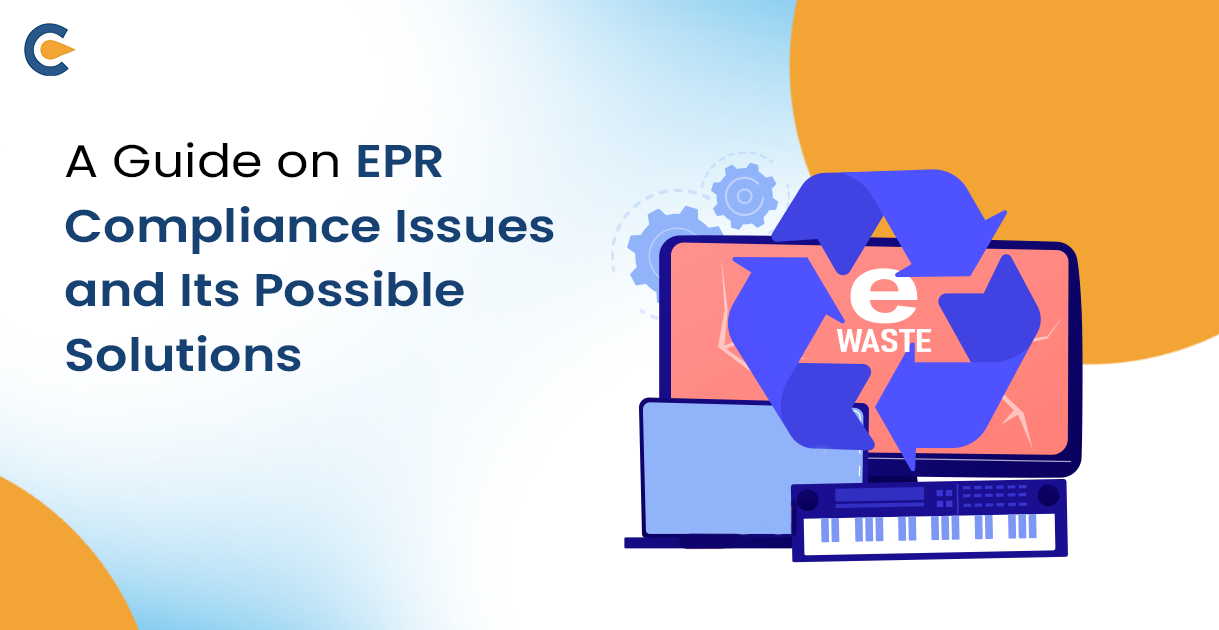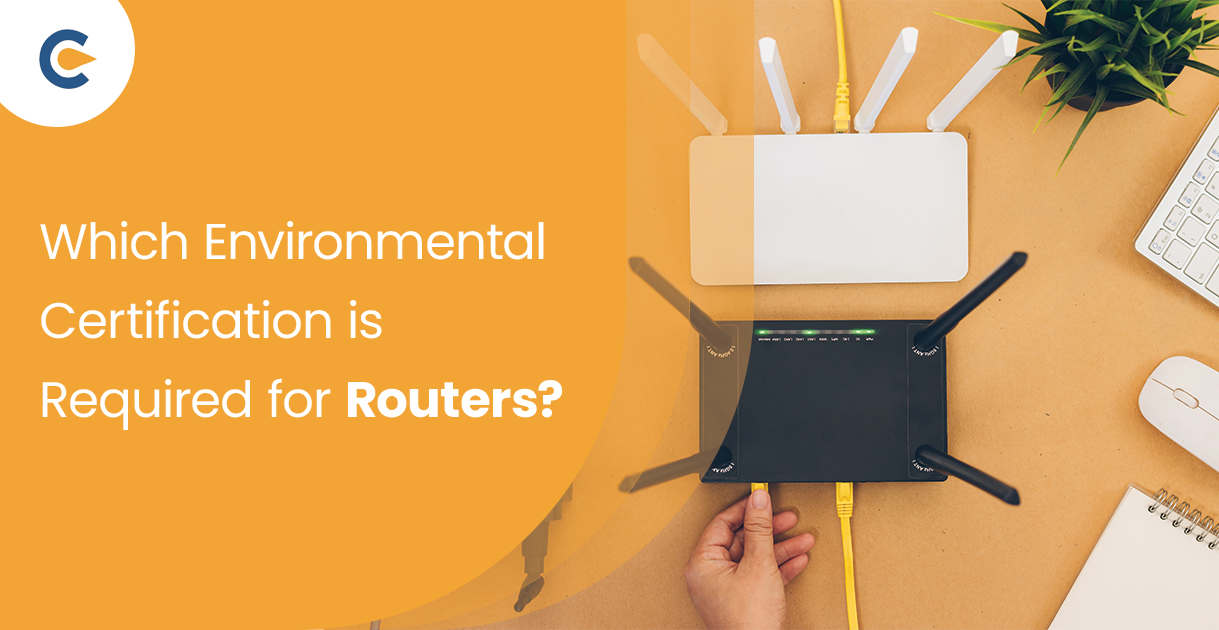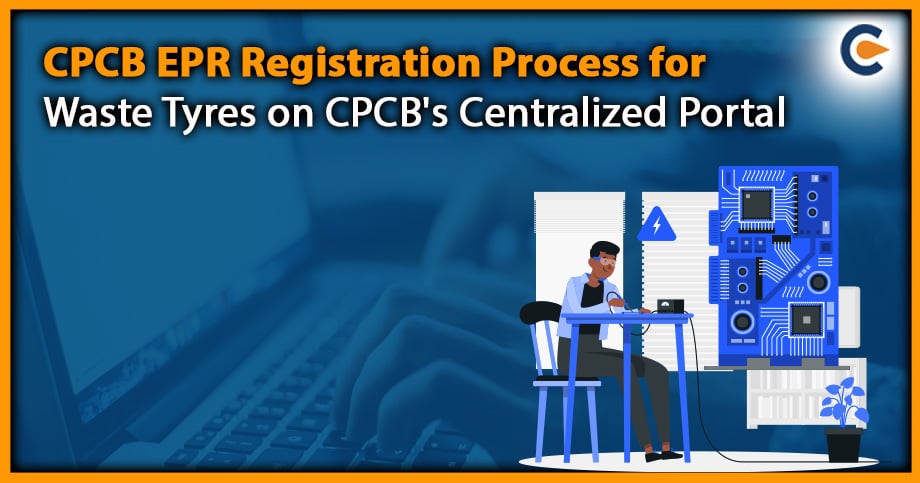In respect of environmental protection and sustainable development, extended producer responsibility is a regulatory framework that originates from the Polluters Pay Principle. EPR compliances guarantee that a product’s manufacturer or producer is aware of the environmental effects and implications of the product’s lifespan. Therefore, EPR compliance issues for manufacturers and producers force them to adhere to all pertinent waste management standards as outlined in the laws and regulations in order to obtain a legitimate EPR permit from the authorities to carry on with their commercial activity. The State and Central Pollution Control Boards, abbreviated as SPCB and CPCB, and the government have granted the Ministry of Environment, Forests, and Climate Changes (MoEFC) the authority to supervise the activities of the industries and manufacturers who fall within the purview of the EPR regime.
Meaning of Extended Producer Responsibility
The Product Responsibility Organizations (PROs) are the Central Pollution Control Board, State Pollution Control Board, and other regulatory bodies that work together to make sure the manufacturers and distributors have the necessary plans and infrastructure in place to ensure effective waste collection, disposal, recycling, and management, as well as the efficient delivery of the finished product to customers. Statutory authorities also make sure that the organizations follow the rules for record-keeping and periodic reporting, which are important because they enable the government to monitor data on hazardous waste management and create policies that will help implement successful future measures. This process is known as the Extended Procedure Responsibility or EPR of the manufacturer or owner of the manufacturing premises or producer. The primary goal of EPR registration is to incentivize organizations to create EPR plans that outline activities meant to fulfil legal obligations related to safe disposal and waste management. For efficient disposal of EPR compliance issues, a strategic approach towards EPR compliance is necessary.
Importance of EPR Compliance
Manufacturers and Producers must comply with EPR regulations to guarantee that their products work in harmony with the broader frameworks for sustainable development and environmental protection, which are overseen by statutory organizations called Product Responsibility Organizations (PRO). These PROs’ primary duty is to monitor market participants’ adherence to EPR regulations and to enforce such compliance when they see non-compliance. Obligations related to manufacturing recycling may initially seem onerous and costly, yet producer organizations gain from them in a number of ways, including –
Promotes Eco- friendly and sustainable development
Manufacturers’ and producers’ adherence to EPR regulations promotes industry development potential and supports overall sustainable growth. By reducing the cost of waste transportation, collection, and management, adjusting waste disposal techniques, and facilitating the introduction and quick spread of new technologies and eco-modulation models – such as producing biofuels from discarded crop waste and household fuels from animal waste like cow dung, husk and crop waste, etc. It also boosts the GDP and growth rate of the economy. Manufacturers must comply with EPR regulations not only as required by law but also to demonstrate their commitment to resource efficiency and environmental protection through the use of ESG products.
Role of EPR in Waste Management
For entities to ensure EPR Compliance Issues are solved, regulatory guidelines are to be followed, and waste management strategies are put in place. EPR registration is a critical component. Producers, importers, dealers, and recyclers now have annual and periodic compliance and reporting obligations set by the Producer Responsibility Organizations, making it simple and traceable to monitor their EPR targets. The waste-producing organization must submit all required paperwork and receive a clearing certificate, known as the Consent to Operate and Consent to Establish—from the CPCB in order to be granted an EPR authorization. The process of obtaining an EPR authorization and registration for SMEs is quite simple and straightforward. Enforcing mandatory EPR registration for manufacturers and producers, in particular, guarantees that the former properly implements sustainable waste management practices and that the latter takes appropriate action to ensure adherence to EPR Regulations.
Optimizing Waste Recycling and Refurbishment Cycle
The manufacturing or producing entity is encouraged to use waste products sustainably by recycling and reusing them, according to EPR rules and EPR compliances for manufacturers. Consequently, EPR compliance issues can be solved by minimizing waste and optimizing resource use. A circular supply chain makes sure that materials are recycled and reused within the same process, preventing the usage of new or underused resources. Since the original resources are being refurbished and repurposed without repeating the original technique and preventing fresh resource utilization, this process reduces resource depletion and low-carbon emissions.
Reducing the cost of Waste Management
While looking for cost-effective solutions, EPR Compliance issues provide manufacturers with low-cost, highly effective waste management processes. It provides instructions on how to gather, transport, handle, dispose of, and reuse them. After this process, producers can frequently enhance the recycled product by changing its form, efficiency, cost, and price that is offered when it is marketed as a refurbished item on the market. Manufacturers can reduce waste generation costs, energy consumption, processing times, and labour costs by adhering to EPR regulations. Eco-friendly and sustainable product designs are encouraged by EPR Plans, which also aid in reducing waste generated at the source.
What are EPR Compliance Issues?
Despite several amendments made by the government to streamline, ease and effectuate EPR Compliance Issues for manufacturers and to enable them to comply with EPR Compliances and subsequently get an EPR Authorization, most businesses still encounter a number of challenges when it comes to fulfilling their manufacturing recycling requirements. A few of these are –
Constant change in laws and regulations
Extended Producer Responsibility or EPR Regulations, standards, and guidelines are highly dynamic and always evolving. Since its introduction in 2006, manufacturers’ EPR compliances have undergone significant and minor modifications nearly annually. This makes it challenging for businesses and producers to ask the government for EPR Authorization. Also, it might be challenging to determine whether a given industry must adhere to EPR compliances for manufacturers due to ambiguity in the list and categorization of businesses.
Documentation and filing process
Making applications and submitting documentation to the Producer Responsibility Organizations and Pollution Control Boards is a challenging procedure that must be completed in order to receive an EPR authorization. As a part of dealing with EPR Compliance Issues, It is difficult for manufacturers to comply with the application requirements for EPR authorization and EPR authorization because of the complicated and time-consuming nature of the law’s reporting and application requirements, which call for many clearances and permissions.
Understanding EPR Regulations
A number of laws and regulations that license, control, and supervise EPR Plans and EPR compliances for manufacturers in India are part of EPR Compliance Issues in the country. The nature and kind of the original product, waste generated at the source, waste generated during processing, product design, and packaging are the main factors that determine the applicable EPR Regulations. When an organization complies with Extended Producer Responsibility or EPR Regulations and practices for its products, it demonstrates its commitment to sustainable practices and environmentally friendly ways for the manufacture of used and discarded products. Adapting EPR compliances for manufacturers demonstrates the commitment of companies and manufacturers towards sustainability, strengthens product reliability and brand value in the market, increases the efficiency of the products by recalibrating their reusability, and ensures regulatory compliance for the complete product lifestyle under the EPR regime.
EPR compliances for manufacturers and producers vary as per the nature and category of waste generated by the manufacturing unit. They are generally governed by Product Responsibility Organizations, such as the State Pollution Control Board and Central Pollution Control Board, and the producer entities are required to obtain an EPR Authorization form for these entities only. The various laws and regulations applicable to industries and manufacturing units on the categorization of waste generated are –
- Battery Waste (Management and Handling) Rules, 2001
- Battery Waste Management Rules,2022
- E-Waste (Management and Handling) Rules, 2011
- Environment Protection Act, 1986
- Water (Prevention & Control of Pollution) Act, 1974
- Air (Prevention & Control of Pollution) Act,1981.
- Hazardous and Other Wastes (Management & Transboundary Movement) Rules, 2016
Document required in the process to obtain EPR Certification
The statutory authority must receive a number of documents in order for the production entity to receive a valid EPR Certification. Once these documents are verified, the EPR Certificate is granted. The documents required for the purpose of making an application for EPR Certificate are –
- Registered office addressand proof of ownership of the business
- BIS License
- Charter Document of the business of the manufacturer – AOA, MOA, CIN, DIN
- Product information and details of specifications
- GSTIN Certificate and PAN of the company
- EPR Action Plan
- CPCB Certification
- Consent to Establish and Consent to Operate
Conclusion
Extended Producer Responsibility or EPR is an environmental protection Concept that aims to fasten liability upon the procedures, manufacturers, distributors, and importers of waste products and products made from refurbishing solid waste as well as importing raw waste from one place to another. EPR Compliance Issues are pertinent for each and every type of business nowadays. It reflects the commitment of businesses towards sustainingly and adherence to state policy for environment protection, at the same time optimizing the business operations towards more holistic growth.
With a team of knowledgeable experts and consultants, Corpbiz is a committed provider of professional services. They are effective in helping you meet all of your organization’s primary environmental compliance requirements. Our staff will help you at every stage of the process to make sure your EPR application process proceeds quickly and without hiccups, starting with the online application, document verification and submission, relying on objections, and, ultimately, approval of EPR authorization.
Frequently Asked Questions (FAQs)
The concept of pollution control, known as Extended Producer Responsibility, or EPR for short, envisions the Polluter’s Pay Principle and the lifecycle management of products. According to the EPR compliance for manufacturers principle, anybody who, by their actions, contributes to any harmful influence on the environment is responsible for mitigating the impact by restoring the environment to its pre-damaged state.
An EPR is a certification of environmentally sound practices for E-waste management practised by the producer entity. EPR Authorization is issued by the Central Pollution Control Board (CPCB) after the producer entity has cleared all compliances related to E-Waste Management.
Producers, Manufacturers, Collectors, Transporters, Recyclers, Refurbishers, and Importers are some of the stakeholders involved in an EPR product life cycle. Regulation-making, activity supervision, and stakeholder penalties for non-compliance fall within the purview of regulatory authorities such as the Central Pollution Control Board and State Pollution Control Board.
EPR Certification is an authorization by the regulatory authorities, which signifies that an entity is compliant with the manufacturing recycling obligations as per the respective EPR regulations or laws pertaining to different categories of waste plastic waste, battery waste, e-waste, etc. Every producer, Manufacturer, Importer, and Recycler of waste products is required to have a valid EPR Certification.
The EPR Certification is issued by India’s national pollution control body, The Ministry of Environment, Central Pollution Control Board, Forest and Climate Change.
The EPR certification to fulfil EPR compliance issues requires all major information about the applicant as well as the business activity undertaken, along with the details of the product. The documents required are –
• Address Proof, ID, and other details of the manufacturer or producer entity – PAN, AADHAR
• proof of ownership and address proof of the business premises
• Charter Document of the business of the manufacturer – AOA, MOA, CIN, DIN
• Product information and details of specifications
• GSTIN Number
• EPR Action Plan
• CPCB Certification
• CTO/CTE Certificate
CPCB takes about 40 to 60 days after submitting an Application Form to issue an EPR certification.
EPR authorization in India is governed by various pollution control regulations. Such as-
1. Battery Waste Management Rules,2022
2. Battery Waste (Management and Handling) Rules, 2001
3. Environment Protection Act, 1986
4. Water (Prevention & Control of Pollution) Act, 1974
5. Water (Prevention & Control of Pollution) Act,1981.
6. Hazardous and Other Wastes (Management & Trans boundary Movement) Rules, 2016
Yes, if you are in a waste-management industry and/or deal with recycled products, a valid EPR certification is a necessary environmental compliance for your business as it signifies compliance with environment protection and sustainable development regulations and guidelines as laid down by the government.
Non-conformity with the EPR compliances for manufacturers can lead to a penalty of up to Rs. 1 lakh or imprisonment of up to a term of 5 years for the manufacturer as per the Environment Protection Act, 1986.
Corpbiz is a leading advisory and corporate services provider that has helped thousands of businesses keep up with compliance and regulatory requirements. Our efficient and cost-effective services ensure that you do not miss out on any compliance related to EPR guidelines as EPR Compliance Issues pertaining to a waste-management business.
Read our Article: Mandatory List Of Products For EPR Authorisation











